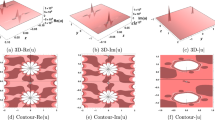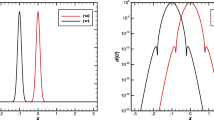Abstract
Data assimilation algorithms are a crucial part of operational systems in numerical weather prediction, hydrology and climate science, but are also important for dynamical reconstruction in medical applications and quality control for manufacturing processes. Usually, a variety of diverse measurement data are employed to determine the state of the atmosphere or to a wider system including land and oceans. Modern data assimilation systems use more and more remote sensing data, in particular radiances measured by satellites, radar data and integrated water vapor measurements via GPS/GNSS signals. The inversion of some of these measurements are ill-posed in the classical sense, i.e. the inverse of the operator H which maps the state onto the data is unbounded. In this case, the use of such data can lead to significant instabilities of data assimilation algorithms. The goal of this work is to provide a rigorous mathematical analysis of the instability of well-known data assimilation methods. Here, we will restrict our attention to particular linear systems, in which the instability can be explicitly analyzed. We investigate the three-dimensional variational assimilation and four-dimensional variational assimilation. A theory for the instability is developed using the classical theory of ill-posed problems in a Banach space framework. Further, we demonstrate by numerical examples that instabilities can and will occur, including an example from dynamic magnetic tomography.
Similar content being viewed by others
References
Carrassi A., Ghil M., Trevisan A., Uboldi F.: Data assimilation as a nonlinear dynamical systems problem: Stability and convergence of the prediction-assimilation system. Chaos: Interdiscip. J. Nonlinear Sci. 18(2), 023112 (2008)
Colton, D., Kress, R.: Inverse acoustic and electromagnetic scattering theory, 2nd edn. Springer (1997)
Engl H.W.: On the choice of the regularization parameter for iterated tikhonov regularization of III-posed problems. J. Approx. Theory 49(1), 55–63 (1987)
Hauer K.-H., Kühn L., Potthast R.: On uniqueness and non-uniqueness for current reconstruction from magnetic fields. Inverse Probl. 21(3), 955–967 (2005)
Hauer K.-H., Potthast R.: Magnetic tomography for fuel cells—current status and problems. J. Phys. Conf. Ser. 73, 012008 (17 pp) (2007)
Hauer, K.-H., Potthast, R., Wannert, M.: Algorithms for magnetic tomography—on the role of a priori knowledge and constraints. Inverse Probl. 24(4), 045008 (2008). http://dx.doi.org/10.1088/0266-5611/24/4/045008
Hauer K.-H., Potthast R., Wüster T., Stolten D.: Magnetotomography—a new method for analysing fuel cell performance and quality. J. Power Sources 143(1–2), 67–74 (2005)
Jazwinski, A.H.: Stochastic processes and filtering theory. Academic Press (1970)
Kaipio, J., Somersalo, E.: Statistical and computational inverse problems (applied mathematical sciences), 1 edn. Springer (2004)
Kalman R.E.: A new approach to linear filtering and prediction problems. Trans. ASME—J. Basic Eng. 82(Series D), 35–45 (1960)
Kress R., Kühn L., Potthast R.: Reconstruction of a current distribution from its magnetic field. Inverse Probl. 18(4), 1127–1146 (2002)
Kress R.: Linear integral equations: v.82, vol. 82, 2nd edn. Springer, Berlin (1999)
Lahoz W., Swinbank R., Khattatov B.: Data assimilation: making sense of observations. Springer, Berlin (2010)
Lewis J.M., Lakshmivarahan S., Dhall S.: Dynamic data assimilation: a least squares approach. Cambridge University Press, Cambridge (2006)
Marx, B.A.: Dynamic magnetic tomography. Der Andere Verlag (2011)
Park, S.K., Xu, L.: Data assimilation for atmospheric, oceanic and hydrologic applications. Springer (2009)
Potthast R., Graben Pb.: Inverse problems in neural field theory. SIAM J. Appl. Dyn. Syst. 8(4), 1405–1433 (2009)
Potthast R., Kühn L.: On the convergence of the finite integration technique for the anisotropic boundary value problem of magnetic tomography. Math. Methods Appl. Sci. 26(9), 739–757 (2003)
Potthast, R., Moodey, A.J.F., Lawless, A.S., Jan van Leeuwen, P.: On error dynamics and instability in data assimilation. Preprint. http://www.reading.ac.uk/web/FILES/maths/preprint_12_05_Lawless.pdf
Potthast R., Wannert M.: Uniqueness of current reconstructions for magnetic tomography in multilayer devices. SIAM J. Appl. Math. 70(2), 563–578 (2009)
Robinson, A.R., Lermusiaux, P.F.J.: Overview of data assimilation. Harvard reports in physical/interdisciplinary (ocean sciences), The Division of Engineering and Applied Sciences Harvard University, Cambridge (2000)
Wannert, M.: Stabile Algorithmen für die Magnetotomographie an Brennstoffzellen. PhD thesis, Universität Göttingen (2009)
Warner T.T.: Numerical weather and climate prediction. Cambridge University Press, Cambridge (2011)
Author information
Authors and Affiliations
Corresponding author
Rights and permissions
About this article
Cite this article
Marx, B.A., Potthast, R.W.E. On instabilities in data assimilation algorithms. Int J Geomath 3, 253–278 (2012). https://doi.org/10.1007/s13137-012-0034-5
Received:
Accepted:
Published:
Issue Date:
DOI: https://doi.org/10.1007/s13137-012-0034-5




